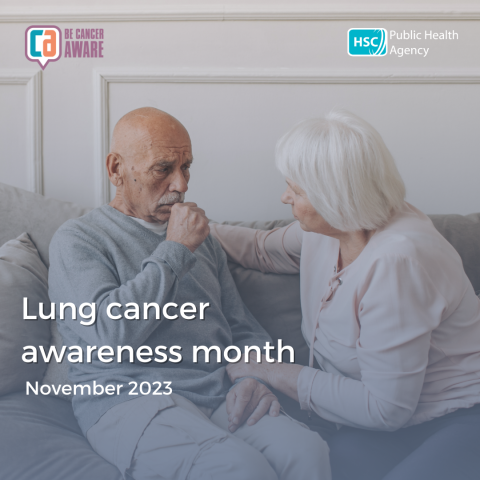Lung cancer awareness month: be aware of the signs and symptoms

This Lung Cancer Awareness Month (November) the Public Health Agency (PHA) is reminding people to be aware of the signs and symptoms of lung cancer.
Lung cancer is one of the most common cancers in Northern Ireland with over 1,300 people diagnosed in 2021.
Dr Louise Herron, Consultant in Service Development and Screening at the PHA said: “Lung cancer is more common in people over 50 but no matter what age you are, it is so important to be aware of the signs and symptoms of lung cancer as spotting it early could make a huge difference.”
Signs and symptoms of lung cancer may include:
- a persistent cough (for more than 3 weeks);
- coughing up blood or blood-stained phlegm;
- chest and/ or shoulder pains;
- tiredness and loss of energy;
- weight loss (for no obvious reason);
- shortness of breath or wheezing;
- hoarse voice;
- a change in the shape at the end of your fingers (clubbing).
Dr Herron concluded: “You could experience some or all of these symptoms and it may not be anything serious, but if you’ve experienced these symptoms for three weeks or more or have any concerns at all, it’s important to contact your GP because finding lung cancer early improves the chances of successful treatment.
“There are some ways you can reduce your risk of lung cancer including stopping smoking, maintaining a healthy weight, eating healthier foods, limiting alcohol intake and being more active.”
Quitting smoking is one of the biggest proactive steps we can take to improve our health and general wellbeing, and longer term it can also help ease the pressure on our health service by reducing smoking-related illness.
Just 20 minutes after you stop smoking your heart rate drops to a healthier rate. Circulation improves, and your lung function increases between two and 12 weeks afterwards. After one year your risk of coronary heart disease is about half that of a smoker’s. After ten years, the risk of lung cancer falls to half that of someone who still smokes.
For more information on the signs and symptoms of lung cancer see www.becancerawareni.info
The PHA’s website www.StopSmokingNI.info offers a range of information and advice for those wanting to quit smoking, including information on local stop smoking services.
For more tips and advice on getting active, setting yourself achievable targets and eating healthier, visit www.ChooseToLiveBetter.com.
